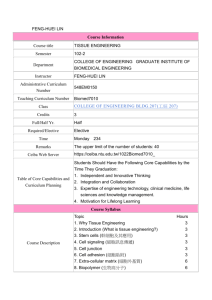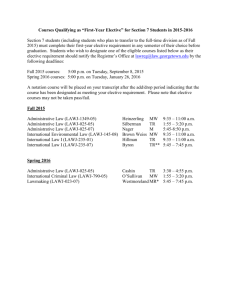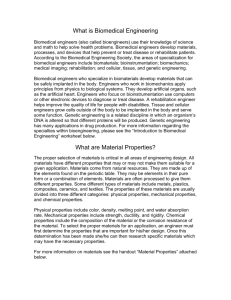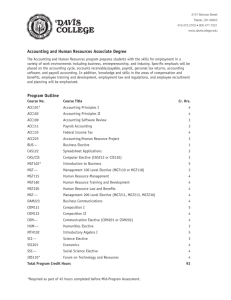The University of Alberta Faculty of Engineering
advertisement
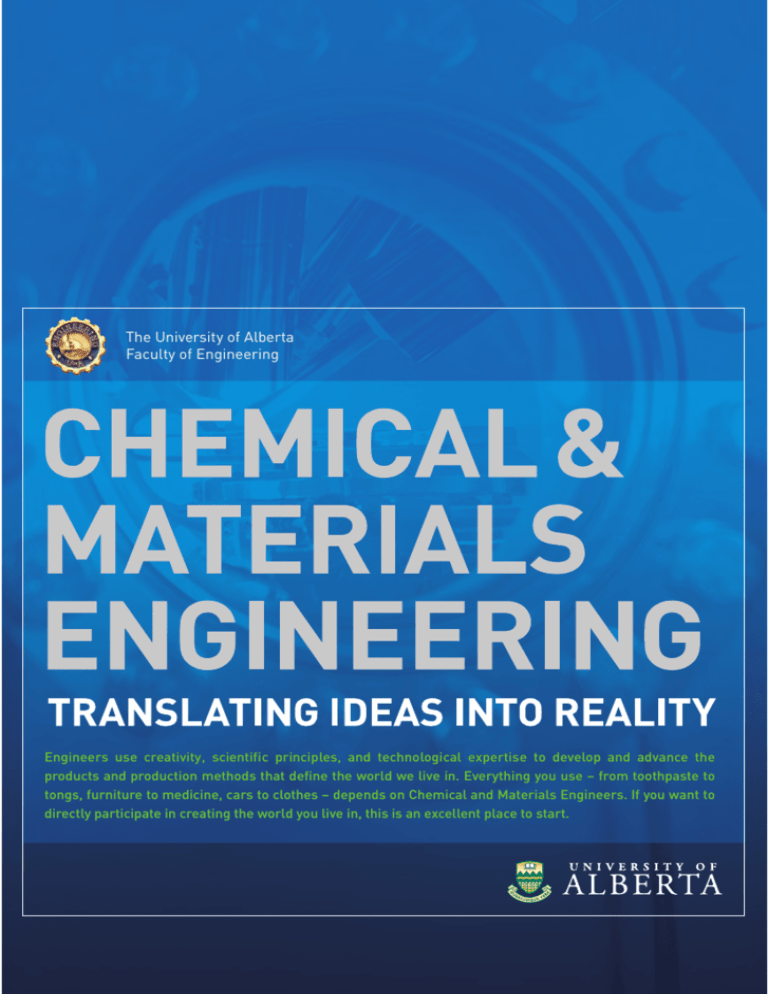
The University of Alberta Faculty of Engineering Engineers use creativity, scientific principles, and technological expertise to develop and advance the products and production methods that define the world we live in. Everything you use – from toothpaste to tongs, furniture to medicine, cars to clothes – depends on Chemical and Materials Engineers. If you want to directly participate in creating the world you live in, this is an excellent place to start. is about designing and engineering materials from molecular or atomic scale, to nano, micro, and macro scales to develop technological solutions to societal problems. Engineered materials enable advances in the fields of energy, biology, medicine, nanotechnology, transportation, secondary resources, and communications. is about changing raw materials into useful products in safe and cost-effective ways. Chemical engineers understand how to alter the chemical, biochemical, or physical state of a substance to produce everything from shampoo to fuels. When you enter Chemical and Materials Engineering at the U of A, you become part of a community that includes your fellow students, professors, and industry mentors. Opportunities for collaborating on challenging and exciting projects exist alongside engaging courses of study. You are supported in your educational pursuits by programs that address academic, personal, and career goals. statistics, engineerin g thermodynamics , and materials science. In the common first year, you will study courses in chemistry, mathematics , physics, computer programming and engineerin g mechanics . In the second term of the first year, you choose your disciplin e and decide between traditiona l and cooperative education streams. Third and fourth years are for specific courses related to Chemical Engineerin g or Materials Engineering such as heat transfer, mass transfer, fluid mechanics , reactor engineering , materials processing, phase transformations, and materials characterization. You can also tailor your studies to reflect your interests by choosing a particular option or elective stream within Chemical Engineering or Materials Engineering . Courses in engineerin g economics, engineerin g management , and other electives can be chosen to prepare you as a business leader. Starting from second year you enter the Chemical Engineering or Materials Engineering program. You will add fundamen tal science and engineerin g Engineering impacts every area of the human endeavour. Which path do you want your career to take? OPTIONS AND ELECTIVE STREAMS IN CHEMICAL ENGINEERING Chemical engineers design, run, and maintain plants and systems that take laboratory or pilot experiments and transform them into viable industry and consumer products and processes. 1 Chemical Engineering The chemical engineer must understand the physics and mathematics behind the problems of heat and mass flow when large quantities of reacting material must be heated or cooled, and moved from one section of the plant to another. She or he must understand the properties of the materials available to build the plant; how they tolerate high pressures and temperatures; and how they resist corrosion and wear. In the design and operation of biotechnology or environmental protection processes, the chemical engineer also needs to understand basic biological principles. Students study the fundamentals of chemistry, physics, and mathematics, and then learn engineering science and design. Graduates are equipped to embark on careers in the chemical, petrochemical, food processing, forest products, pharmaceutical, and semiconductor industries, or work for a government agency. 2 Computer Process Control (CPC) Option Manufacturers depend on computer process control technology to help maintain their competitive edge. Learn to design, implement, and maintain digital computer-directed systems across all fields. A chemical engineer with CPC specialization is in demand in every industrial production process – that’s everything from beer to aspirin, fuels to cosmetics, iPods to paint. 3 Biomedical Option Exploring a biomedical challenge from an engineering perspective provides unique solutions . Learn to use chemical engineerin g principles such as thermodynamics and mass transfer to enable advances in human health and facilitate industrial applications. 4 Oil Sands Engineering Elective Alberta’s oil sands contain over 1.7 trillion barrels of oil – an enormous resource to help meet our energy and industrial needs in Canada and beyond for the next several hundred years. By taking the Oil Sands Engineering Elective you will learn to solve important engineering challenges related to oil sands processing. Related career paths: • Pharmaceutical and medical • Oil, gas, and natural resources • High tech and aerospace • Semiconductor industries Related career paths: • Bioproduct synthesis and recovery • Improved vaccine or drug delivery • New diagnostic technology • Graduate studies leading to careers in biomedical research Related career paths: • Environmental impact reduction • Reduced water usage • Yield improvement • Energy efficiency improvement Elective streams include the Nanoscale Engineering, Mineral Processing and Extractive Metallurgy, and Polymer Materials. OPTIONS AND ELECTIVE STREAMS IN MATERIALS ENGINEERING Materials engineers use physics, chemistry, and mechanics to design, process, apply, and produce materials – from metals and alloys to polymers, ceramics, composites, and semiconductors. 1 Materials Engineering This discipline enables you to develop, modify, and use processes to convert raw materials into useful engineerin g materials with specified desirable properties. The program deals with mineral processing, extractive and physical metallurgy, ceramics, polymers, composites, and aspects of the behaviour of materials in service, including corrosion, wear, and failure. The undergraduate Materials Engineering program is the only one of its kind in the Prairie Provinces and includes lectures and hands-on laboratory sessions emphasizin g underlying principles and their engineerin g applications. Technical electives enable students to explore particular areas of materials with more depth. 2 Biomedical Option Learn how to contribute to health care by developing or integrating innovative materials specifically engineered for medical performance. Metallic alloys, molecularly designed polymers, and tailored composites are gateways to significant progress in medical diagnostics and treatment. 3 Nano and Functional Materials Option Students entering this option will be exposed to the exciting and emerging field of nano and functional materials. Subject areas covered include electronic, optical and magneti c materials, nanomaterials and their applications, nanostructured molecular sieves, nano and functional materials processing and fabrication. Related career paths: • Mineral processing and primary metal production • Materials diagnostics and failure analysis • Oil and gas • Automotive industry • Utilization of secondary resources Related career paths: • Prosthetics design • Implant manufacturing • Disease monitoring devices • Drug delivery • Graduate studies leading to careers in biomedical research Related career paths: • Microelectronic and optoelectronic materials • Nanoscale medical devices • Next generation computers Current elective streams include Mineral Processing and Extractive Metallurgy, Polymer Materials, and Structural Materials. For detailed information, please consult our calendar or visit our website at www.cme.engineering.ualberta.ca Chemical and materials engineers are always in demand, but the best aspect of your degree is that you choose your career and control your future. Enjoy the academic realm? Research and teaching are major academic pursuits that will need people in years to come. Focus on research and you can be a bridge between science and real-life applications for years to come, in virtually any type of laboratory in the world. Drawn to the business world? Work as a consultant, project engineer, manager, or company-building entrepreneur in design, testing, production , maintenance or performance analysis in your desired industry. The world of engineering is constantly expanding and graduates are finding positions in areas that did not exist a decade ago. Wherever your education takes you, we know that you will be glad you chose Chemical and Materials Engineering. Chemical & Materials Engineering University of Alberta 9107 - 116 Street, ECERF Building Edmonton, Alberta, Canada T6G 2V4 Telephone: 1.780.492.3321 Facsimile: 1.780.492.2881 Email: cmeinfo@ualberta.ca Website: www.cme.engineering.ualberta.ca About the Department of Chemical and Materials Engineering With over 500 undergraduate students, over 300 graduate students, and 50 professors, the University of Alberta has one of the largest chemical and materials engineering departments in North America. Class sizes are small and faculty members are friendly and approachable. Numerous teaching awards and a high level of external funding underscore our value. Teaching and research are priorities, along with developing industry partnerships and innovative programs that position our graduates as sought-after professionals – and eventually, leaders of tomorrow’s chemical and materials engineering initiatives.


